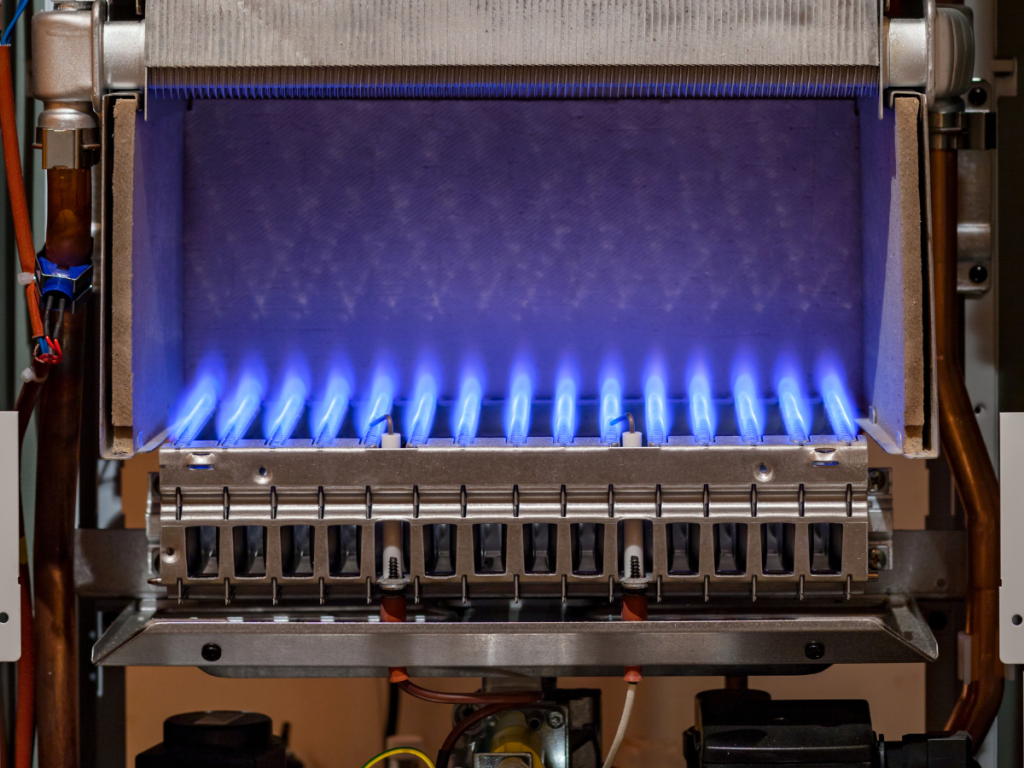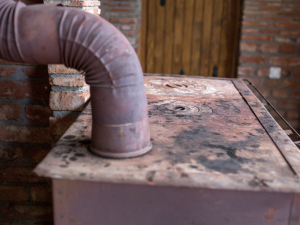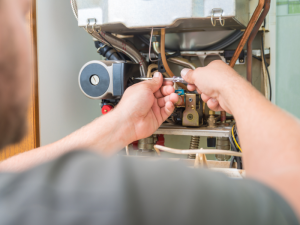Summer can get pretty hot, and homeowners with air conditioners usually kickstart their AC to cool down. But what do you do with a furnace until the temperatures start to drop again?
Should you turn a furnace pilot light off in the summer? Since it’s not in use, turning it off can be a great way to save money on energy bills and take care of your system during the warmer season.
When dealing with electric or gas furnace systems, there are some safety concerns. Read below for some of the benefits of switching your furnace off during the summer, a mini guide on how to do it, and a few reasons why you may wish to keep your system on.
What is a furnace pilot light, and what is it used for?
A furnace pilot light is a small gas flame that remains lit in a furnace at all times. It is used to ignite the main burners when the thermostat signals for heat. The pilot light is typically blue, but it can be different colors depending on the type of gas used.
When lit, it should produce a steady flame and won’t go out unless there’s an interruption in its fuel supply or airflow.
Should you turn your furnace pilot light off in the summer?
Your pilot light is crucial in the cold winters when your furnace works to keep your indoors nice and warm. However, many homeowners wonder if turning off the pilot light in the summer is a good idea when the furnace isn’t in use.
We typically advise homeowners to turn furnaces off in the summer to reduce unnecessary energy consumption. Turning off your furnace pilot light during summer months can provide several benefits for both you and your home. These include:
Reduced energy costs
Turning off furnace pilot lights in the summertime can significantly reduce how much energy your furnace consumes during the year. With less energy consumed overall, this means you can save money on monthly bills and even avoid high maintenance costs.
Also when your furnace is on, it still gives off a bit of heat, meaning your AC unit will have to work against it in the summertime. Turning your furnace off saves you money on your cooling bills as well!
Extended furnace life
When a pilot light is turned off, it’s not constantly burning fuel to heat the air. With less wear and tear on its components, your furnace is less likely to break down early. Add proper maintenance and care to that, and you can enjoy many years of reliable operation with minimal necessary repairs or replacements.
Improved safety
Turning off the pilot light can decrease the risk of harmful gasses like carbon monoxide seeping into your home due to leaks or equipment malfunctions.
By turning off your pilot light in the summertime, you can feel safer in your living space.
More environmentally friendly
Turning off your furnace reduces your overall energy consumption by helping conserve natural resources like coal, oil, and gas. Less fossil fuel use means a sustainable lifestyle and a smaller carbon footprint.
How to turn off a pilot light: A simple guide
Turning off a furnace pilot light is not difficult, but it is important to follow the steps properly and carefully.
To turn a pilot off:
- For safety purposes, turn the main gas valve to the “off” position.
- Locate the dial or switch near the pilot light and switch it “off”.
If you aren’t sure where the off switch is, consult your furnace manual or ask a professional technician. While your furnace is off, it may be a good idea to schedule a maintenance or furnace cleaning appointment so you know everything is working properly come wintertime.
Important note: if you don’t know how to turn your furnace off in the summer or on for the winter, contact a professional for assistance.
Why some homeowners don’t turn off their pilot light
While there are several benefits of turning off your pilot light, it’s worth noting the potential risks so that you can take necessary steps to prevent them.
- May not incur that much savings: For some homeowners, shutting off the pilot light during the summer may not save them that much money on their utility and heating bills each month. So, depending on your situation, it may not be worth it. Also, those without summer HVAC systems who get cold often, may enjoy the extra bit of heat the furnace provides in the evening.
- Potential for accidents: Not following instructions when turning off the pilot light or turning it back on can lead to accidents so always read the manual to familiarize yourself with the process before attempting it.
- Special tools required: Some furnace models might require special tools to turn off the pilot light so it may not be worth the hassle.
With this in mind, should you turn your furnace pilot light off in the summer? Despite these reasons, we would say yes. Turning a furnace pilot light on or off can be dangerous, but as long as it’s done correctly, the risks are minimal.
For help with your furnace and HVAC system, call Clover.
We recommend you turn off your furnace pilot light in the summer as this will help minimize your overall energy consumption and extend the life of your furnace system. If you need help turning your furnace off or with any other parts of your HVAC system, Clover can help. At Clover Contracting, we have experienced and highly trained technicians ready to help you with your furnace.
We also recommend booking a furnace maintenance appointment while your system is off. Whether you need a regular maintenance check, a new furnace installation or repair the professionals at Clover can help you with whatever you need.
Don’t hesitate to book an appointment today.




